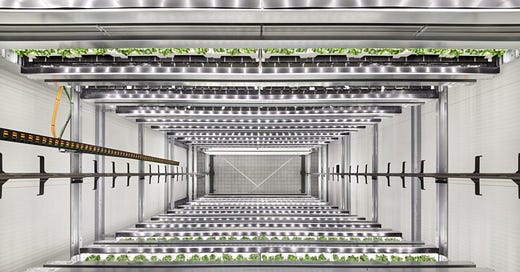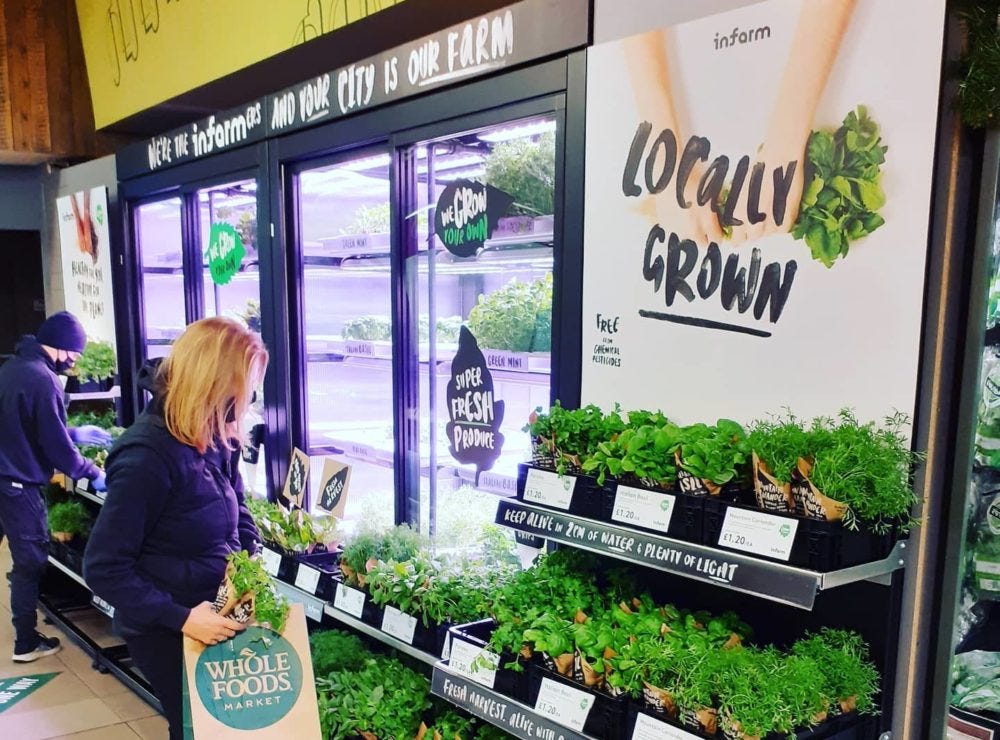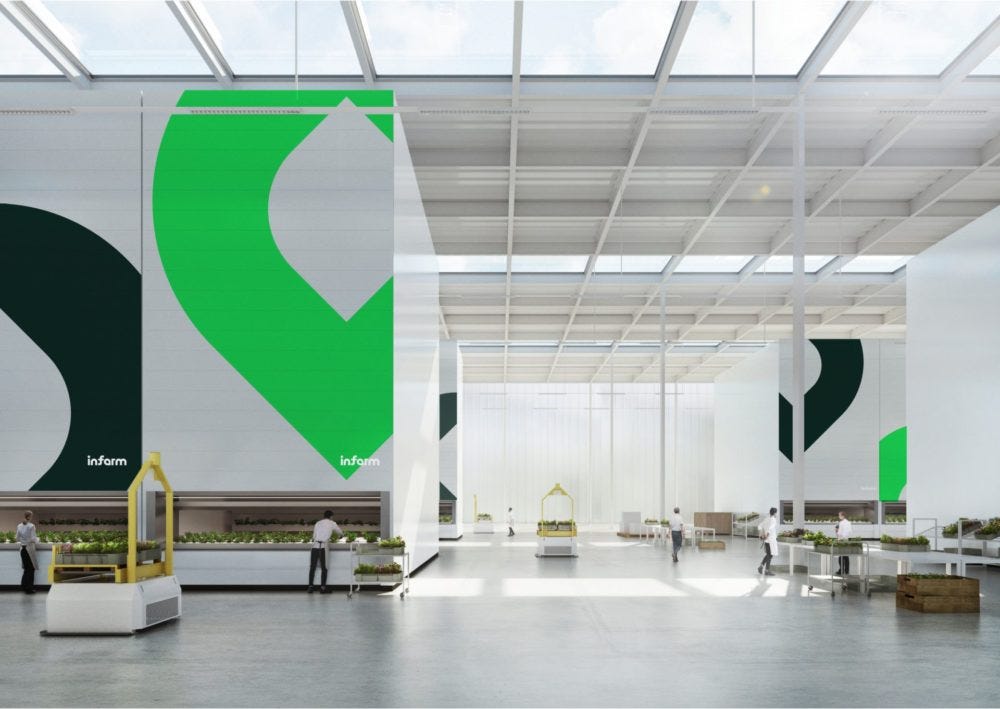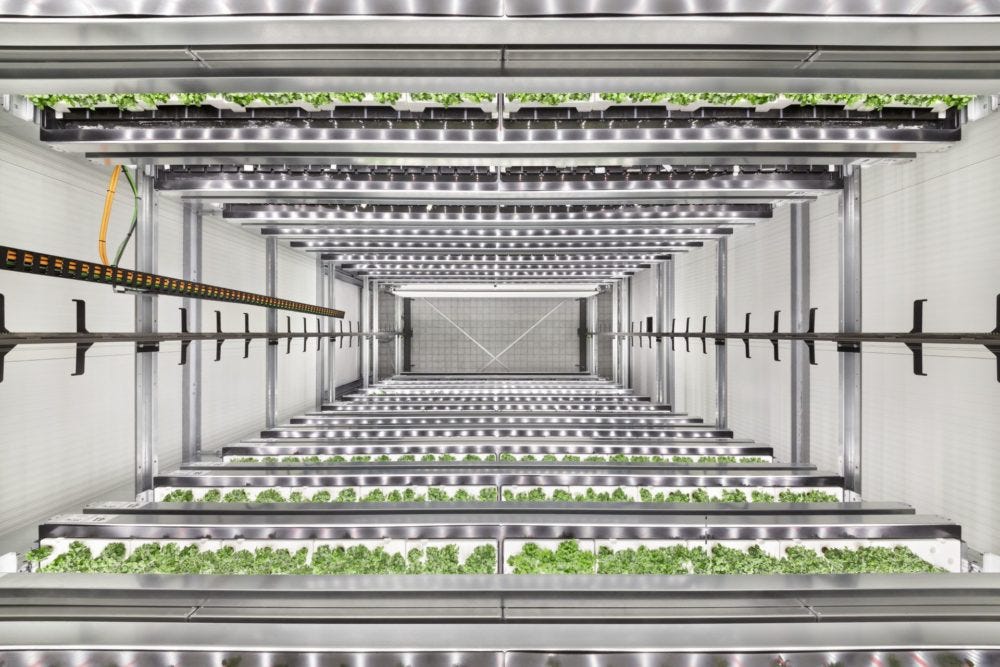Could insolvent Infarm rise again? A look at the vertical farming startup's IP
A new year. A new newsletter...
A new year. A new newsletter…
Welcome to AgriFoodIP, a new blog exploring strategic intellectual property (IP) management and value creation in food and agriculture.
I’ve been thinking about starting this for a while.
I think it’ll be worth explaining why, in more detail, at some point. For now, I’ll just say this: Our food supply is becoming more and more reliant on technological advances in emergent areas like AI, IoT, synthetic biology, and many others. As that trend continues, I see intellectual property (IP) and other intangible assets playing an increasingly important role in the resilience and sustainability of that food supply.
One of the things I’d like to do in this series is to look at the IP portfolios of various startups, incumbents, and research institutions that are making headlines in the critical (and increasingly tech-driven) industry that is food and agriculture.
With that, I thought it’d be a good start for AgriFoodIP if we dive straight in to a current story that’ll give us the opportunity to zoom in on one company’s IP.
And so to Infarm: an indoor farming startup from Germany that raised big money, expanded internationally, and entered the unicorn club; before exiting most of its markets, being declared insolvent, and calling in administrators - all in the space of just a couple of years.
Others have speculated at greater length about what may have gone awry at Infarm from the operational and financial perspectives. Again, here we’re specifically going to look at Infarm’s IP assets and what the future may hold for them; feel free to search online for broader analyses.
75 varieties of crops
Infarm is one of the most recognized names in vertical farming (if you aren’t familiar with vertical farming, click here for a quick explainer). It was founded in Berlin in 2013 by Osnat Michaeli and brothers Erez and Guy Galonska.
Convinced that urban agriculture would be key to driving down the mounting costs and ecological impacts of food production, the three co-founders built a DIY indoor farm in a 1950s Airstream trailer.
Skipping forward: by the end of 2021, Infarm had expanded beyond Berlin to multiple cities in Europe, North America, and Japan, and was valued at more than US$1 billion having raised over US$550 million in venture funding from a variety of high-profile investors. It employed hundreds of people across several countries; claimed to offer 75 varieties of crops including herbs, leafy greens, salads, microgreens, and mushrooms (a seemingly unprecedented selection in the vertical farming space at the time); and had partnered with over 30 major retail chains to sell its produce, including Aldi, Amazon Fresh and Whole Foods, Auchan, Ikea, Kroger, Migros, Safeway, and Marks & Spencer, to name but a few.
After that, Infarm’s fortunes appeared to change.
In November 2022, barely a year since closing a US$200 million Series D round, the company announced mass layoffs and the closure of several facilities as part of “a significant strategy shift […] accelerating its drive towards profitability”.
Explaining the loss of close to 500 jobs - more than half the company’s workforce at the time - the co-founders pointed to “challenging market conditions, particularly with regards to escalating energy prices and tough financial markets […] in addition to inflation, supply chain disruptions. and rising material costs”. This was in the aftermath of the Covid-19 pandemic and Russia’s escalation of hostilities in Ukraine.
In May 2023, CEO Erez said that Infarm would effectively withdraw from European markets to focus on North America and new “high-potential regions better suited for indoor farming, with low energy prices and healthy market demand” such as the Middle East.
By September, Infarm had been declared bankrupt in the Netherlands and insolvent in the UK - where it had relocated its head office in July - with administrators appointed to manage the company.
What regulatory filings reveal about Infarm’s IP and where it may be headed
Based on a publicly-available filing made with UK corporate regulator Companies House last month, Infarm Indoor Urban Farming GmbH - the entity that’s in administration - owes the equivalent of tens of millions of dollars to various creditors. to various creditors.
The filing states that administrators RSM were unable to rescue Infarm as a going concern due to its level of liabilities and are instead aiming to “effect a sale of the majority of the company’s business and assets”.
The administrators go on to state that they are “in discussions with an interested party with a view to effecting a sale imminently” but are unable to disclose additional details at this point “so as not to prejudice the proposed transaction”.
TriplePoint Capital, the sole secured creditor named in the aforementioned filing, had previously loaned money to the startup backed by various company assets - including some of its IP, as indicated in this Google Patents record.
According to the filing, Infarm’s “licences and patents” have a book value of a meagre-sounding €15,000. However, it further notes that the administrators have “excluded estimated-to-realise values so as to avoid prejudicing the sale” mentioned above.
Other regulatory filings give an indication of how this potential sale might be structured and even who the buyer might be.
An entity named May Acquistions Limited was registered with Companies House in September 2023, at around the same time Infarm Indoor Urban Farming entered administration. Earlier this month, May Acquisitions changed its name to Infarm Technologies Limited. Its directors are Erez Galonska and Pavel Romanovski, a founding partner at Hanaco, an Israeli VC firm that had previously invested in Infarm.
A few days before its name change, this entity informed Companies House that it had agreed a loan deal with TriplePoint Capital acting as collateral agent.
Infarm’s IP portfolio is listed as collateral, along with various equipment and financial assets. Among the IP assets included are:
3 patent families; representative international applications with the World IP Organization (WIPO) for each family are linked below:
‘Plant growing system’ - granted in Australia, Brazil, Canada, China, Eurasia, Europe, Hong Kong, Israel, India, Japan, Mexico, Panama, Singapore, South Korea, Thailand, and USA
‘Automatic vertical farming system and method for growing plants in a soilless growing environment’ - pending in Canada, Israel, Qatar, UAE, USA, and Europe
‘Vertical farming system and method using the same’ - pending in Canada, Israel, Qatar, USA, and Europe
1 industrial design family; representative WIPO registration DM/096 112 - ‘Hydroponic plant growing trays’ - covering EU, Norway, Singapore, Switzerland, Turkey, UK, and USA
Over 50 individual registered and pending trademarks across multiple jurisdictions and classes, including word marks, figurative marks, and a Chinese character mark
21 internet domain names across various top-level domains
Last month, Sifted reported that Infarm “may be planning to try things again”.
The publication cited two anonymous employees which told its reporter that it had set up new UK entities to “salvage” its assets; another anonymous employee shared that Infarm planned to “restart” as a farming-as-a-service company in London.
This would back up the notion that the “interested party” is a reconstituted Infarm that will take over the IP portfolio and other assets.
Reflecting the identity change from ‘Infarm Urban Indoor Farming’ to ‘Infarm Technologies’, the reborn company might focus on being a service and tech provider rather than trying to grow produce itself.
Such a model would lean heavily on Infarm’s IP, including the patents and designs underpinning its technology as well as the trademarks and domains associated with its brand.
Another key intangible asset for any service provision model is the knowhow actually required to effectively deploy the technology and services being offered.
As an Infarm employee told Sifted: “I don’t know how they will do that, because a lot of the knowledge has already walked away or has been fired.”
Nevertheless, a lot of knowhow will be tied up in data that Infarm has collected and analysed over the years on things like optimal growing conditions and parameters such as light, temperature, and humidity for cultivating the various crops it has grown; as well as the logistics around keeping these crops healthy and fresh on their way to stores. This data constitutes another critical intangible asset that is not explicitly listed in any of the Companies House filings, which also make no mention of any of the software that Infarm will have built to remotely manage its network of vertical farms. These may be among the company’s most valuable intangible assets.
Of course at this stage, awaiting further information from the company’s administrators, all of the above is informed speculation. It may be the case that an unrelated third party steps in to acquire some or all of Infarm’s assets; or that no sale happens at all.
Watch this space.
Infarm is certainly not the only indoor farming startup to have hit upon hard times, and almost certainly won’t be the last. What its story tells us is that tech startups, in agrifood or any other segment, shouldn’t overlook the importance of IP and other intangibles as they are building their businesses.
Most IP ends up being worthless. But it doesn’t have to.
When things take a turn for the worse, these assets may provide a chance - a chance, not a guarantee - of recouping some value by enabling alternative business models, securing a financial lifeline, or bringing in buyers.
What is vertical farming?
Vertical farming refers to automated setups that enable the cultivation of produce indoors in vertically-stacked units, typically using hydroponic (i.e., soil-free) systems to feed and water the plants, along with artificial lighting and temperature controls.
Vertical farming is a subset of controlled environment agriculture (CEA for short), a catch-all term for automated or semi-automated indoor farming paradigms that may also include, for instance, tech-enabled glasshouses.
The purported advantages of vertical farms is that they allow for a high level of localization, making possible the urban production of crops that conventionally have to be grown outside in rural areas. This theoretically cuts down on greenhouse gases from food transportation and logistics.
Vertical farms also reduce emissions and pollution associated with conventional farming; in particular, from the overuse of agrochemicals and water. Since vertical farms are maintained as ultra-hygienic environments and typically don’t use soil or untreated water, they are far less exposed to pests and disease, meaning that they can generally be run chemical-free.
Because they require much less physical space than traditional open-air agriculture, vertical farms can be placed within or alongside existing urban infrastructure, such as warehouses, office towers, apartment buildings, shops, or restaurants.
By growing indoors in a controlled environment, crops are not exposed to adverse weather and other environmental conditions; this also presents the opportunity to grow crops out of season and out of their natural geographic range (e.g., Singrow is producing strawberries, a temperate fruit, in tropical Southeast Asian cities).
As for disadvantages: vertical farms currently require a huge amount of energy in order to run effectively. Lighting to replace sunlight, HVAC to regulate temperatures and moisture, and an assemblage of pumps, robotics, sensors, and cameras all need a constant supply of electricity. And as the prices of energy shoot upwards, so do costs for vertical farming operations. On top of this are real estate costs, which can become eye-wateringly high in key cities like New York or Singapore. This means the end price point for vertically-grown produce - already sold at a premium - rises for consumers, who are less likely to buy.
Click here to skip back to the main body of the article.
Thank you for reading this first edition of AgriFoodIP. Back next week!





